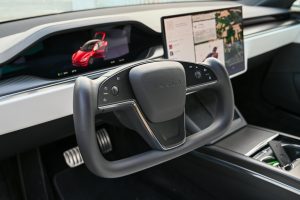Electric vehicles (EVs) are no longer just symbols of environmentalism—they’ve become a central pillar of China’s national strategy. From energy security and climate goals to global tech competition and industrial upgrading, the rise of EVs reflects China’s ambition to reposition itself in the global order.
Here’s a deep dive into the key reasons Why Is China Aggressively Developing Electric Vehicles?
1. Energy Security: Reducing Dependence on Imported Oil
China is the world’s largest oil importer. As of 2024, its daily crude oil imports exceeded 11 million barrels, with over 72% dependent on foreign sources (source: National Energy Administration of China). This reliance poses a strategic risk, especially in times of global geopolitical instability or energy price shocks.
EVs, powered by electricity, allow for diverse energy sourcing—from coal to hydro, wind, and solar. This shift enables China to reduce its dependence on petroleum and build a more autonomous and secure energy system.
2. Climate & Environmental Commitments: Meeting Carbon Neutrality Goals
China has pledged to peak carbon emissions by 2030 and achieve carbon neutrality by 2060. According to the Ministry of Ecology and Environment, the transport sector contributes around 10% of the nation’s carbon emissions.
EV adoption is key to reducing transportation-related emissions. By the end of 2024, China had over 20 million EVs on the road, representing nearly half the global total and reducing CO₂ emissions by over 100 million tons annually. From electric buses and taxis to e-scooters, green mobility is rapidly expanding from major cities to smaller regions.
3. Industrial Leapfrogging: Overtaking Traditional Automotive Giants
For years, China was relegated to low-end roles in the gasoline vehicle supply chain, while tech and branding power remained in the hands of Western and Japanese automakers.
But the EV era has given China a chance to leap ahead. In 2023, BYD surpassed Tesla in global EV sales. Startups like NIO, Xpeng, and Li Auto have made significant breakthroughs in smart driving and battery technology.
The EV industry now symbolizes China’s shift from “Made in China” to “Innovated in China,” drawing both global capital and domestic talent into its supply chain.
4. Technology Convergence: Cars as Smart Hardware Platforms
Modern EVs are no longer just vehicles—they are AI-driven smart terminals, integrating cloud computing, autonomous driving, IoT, and big data.
Chinese tech giants are investing heavily: Huawei launched its own EVs, Xiaomi entered the market with the SU7, and Baidu Apollo is scaling Robotaxi fleets. These collaborations between automakers and tech companies accelerate the development of car operating systems, smart dashboards, and self-driving features.
By 2025, over 50% of EVs sold in China are expected to support Level 2+ automation, ahead of the US and EU.
5. Global Expansion: Exporting EVs and Setting Global Standards
As Europe plans to ban gasoline car sales by 2035, Chinese automakers are going global. BYD has launched stores in Germany and the UK, MG is gaining traction in France and Italy, and Geely is collaborating with Volvo to push its Polestar brand.
In 2024, China exported over 1.3 million EVs, a 70% year-over-year increase. Beyond just vehicles, China is also exporting battery technologies, charging infrastructure, and industry standards.
This isn’t just trade—it’s a geopolitical push to secure China’s influence in the global EV ecosystem.
6. Policy Support: Strong Governmental Guidance and Incentives
Unlike the fragmented EV policies in the West, China has adopted a top-down approach with long-term coordination:
- Purchase subsidies, tax exemptions, and free license plates;
- Nationwide charging infrastructure, with over 8 million chargers built by 2025;
- Integration of EVs into smart grid systems led by State Grid and China Southern Power Grid.
Local governments have also issued targeted policies:
Shenzhen has banned fossil-fuel ride-hailing vehicles,
Shanghai offers free green license plates,
Beijing applies stricter driving restrictions on gas-powered cars.
Final Thought: EVs Are China’s Next “National Champion Industry”
At the intersection of energy transformation, technological revolution, and economic upgrading, EVs are no longer just a consumer product—they are a strategic tool.
For China, this is not just about “whether to go electric.” It’s about using EVs to reshape its energy independence, industrial power, and global standing.



